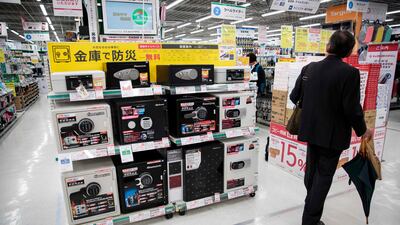The Tokyo stock market might be riding two-decade highs, but a growing number of Japanese are choosing to stash their cash in the humble home safe, wary of negative interest rates in the bank and out of the view of eagle-eyed tax officials.
It is no secret that Japan has some of the world's biggest savers, learning from an early age to put aside some of their hard-earned wages for a likely long retirement.
However, cautious households who already put away more than half their nest-egg in cold hard yen, are increasingly bringing the cash home.
Part of the reason is a longstanding savings culture. But the Bank of Japan's move to usher in negative interest rates last year and changes to the tax code have propelled demand for alternatives to keeping money in the bank.
And that has seen home safes that cost from as much as 20,000 yen (US$180) fly off store shelves, with sales surging by a fifth last year.
Demand is so strong that staff at one Tokyo outlet of Bic Camera have hauled the steel boxes from the back of the shop to a prime spot right near the escalators.
That dovetails with a recent Bank of Japan study that found investors socked away no less than half of their combined 1.8 trillion yen savings in cash, while about 10 per cent was put into stocks and 19 per cent in other retirement and life insurance policies.
By contrast, Americans hold just 13 per cent of their savings in cash and just over a third in equities, while Europeans fall somewhere in between.
This despite that fact that Tokyo's benchmark Nikkei 225 index has been rising since its financial crisis trough in 2009 and is now sitting at its highest levels for 21 years.
"Investing is seen by many Japanese as a whole other world," said Kaneko Ito, a personal finance consultant at Japan's All About advisory site.
______
Read more:
Corporate scandals drag Japan Inc's reputation through the mud
Japan vows no more deaths from overwork while building Olympic arena
______
The wealth of Japan’s households climbed to a fresh record at the end of 2016, helped by a rebound in stocks and people saving more, according to Bank of Japan data.
The Japanese had a record 1,800 trillion yen in savings, stocks and other financial assets as the end of last year. Of this, 937 trillion yen, or 52 per cent of their assets, were stored in cash and bank deposits.
Cash is king in Japan and credit cards are much less popular than in other countries so it's common for people to carry around relatively large amounts of yen to pay for day-to-day things.
The country's low crime rate is one reason people feel safe keeping cash in their house - the odds of a burglary are relatively low.
In fact, sometimes first responders come across huge sums of money being kept in the homes of recently deceased people.
Like in some other Asian nations, Japanese people are told from an early age that they must save for the future with finger-wagging parents reminding adult children to "put some aside" and not to borrow too much.
Some lessons were also learned from Japan's phenomenal post-war economic boom that ended with the collapse of a stock and real estate market bubble in the early nineties.
Years of deflation and slow growth followed, a point not lost on many risk-averse savers.
"It's a question of culture and education - protecting oneself rather than being aggressive, and avoiding losses rather than maximising profits," Mr Ito said.
"Before the bubble burst in the nineties, bank interest was extremely high. You could double your money in a decade so there was no reason to opt for riskier investments," he added.
Not so anymore. The central bank introduced negative interest rates in a bid to kickstart bank lending and the broader economy.
That means the average saver can literally be paying to put their money in a bank, depending on how much they shell out in fees for withdrawals and transfers but get almost no interest.
Changes to the tax code may have also spurred this flight to cash savings and combination safes as people worry that more visible savings could be spotted by keen-eyed revenue collectors.
But it's not just regular folks that are loving the cash - Japan's conservative firms are keeping some 400 trillion yen in reserve equivalent to about 75 per cent of the country's entire gross domestic product.
And with price and wage growth in the country remaining weak, according to new data, firms arewary of passing more of their profits to employees.
Japan’s jobless rate stood at a 23-year low of 2.8 per cent in August, reflecting a strengthening economy and shrinking working-age population in a rapidly ageing society.
Wary of increasing fixed costs, many firms make up for the shortage by hiring more temporary workers instead of raising salaries for their higher-earning permanent employees - a trend that has kept overall wage growth subdued.
“The economy is doing well. But our labour force is shrinking, so the shortage of workers that companies experience will get worse,” said Miyagawa at Mizuho Securities.
“Companies know that wages aren’t rising that much, so they are reluctant to raise prices. In this situation, the BOJ cannot exit from quantitative easing.”

